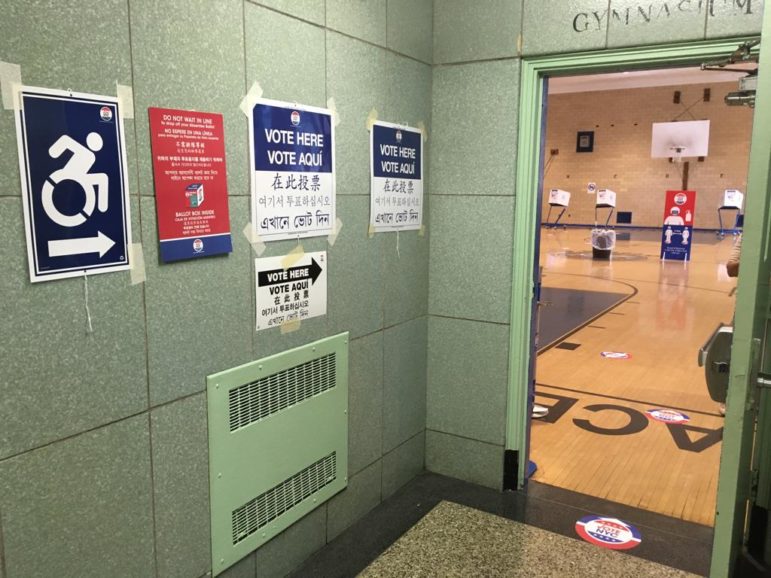Spanish translators were missing at two Queens polling places that City Limits visited Tuesday morning, while interpreters for other languages said they had interacted with very few voters.

Adi Talwar
Evening on primary day at the polling station located at Mosholu Montefiore Community Center in the Bronx.

A slow day at the polls Tuesday was nevertheless affected by a familiar problem: a lack of interpreters to assist non-English speakers at some sites.
Spanish translators were missing at two of three Queens polling places that City Limits visited Tuesday morning, while interpreters for other languages said they had interacted with very few voters.
Michael Gilmore, voting site coordinator at P.S. 220 in Forest Hills, said the polling place was short-staffed Tuesday, but voter turn-out was also especially low. Just 44 people had shown up to cast their ballots by 11 a.m.—five hours after polls opened—for an average of one voter about every seven minutes.
“If we get 200 voters today, I’ll be happy,” Gilmore said.
A scheduled Spanish language interpreter did not report to the site, but a poll worker who understood the language was able to help voters, he said.
In addition to the Board of Elections translators at these voting places, there were interpreters hired through the Poll Site Language Assistance Program of the NYC’s Civic Engagement Commission (NYCEC), assigned to locations with large concentrations of non-English speakers. That applies to most of New York City.
The City Planning Commission estimates that about half of New York City residents speak a language other than English at home, while a quarter of all New Yorkers are not proficient in English. Linguistic barriers can be a problem at the polls without sufficient interpretation services.
Language and identity can also inform how voters choose their candidates. Hugo Gaitán, a Spanish-speaking registered Democrat, said he chose candidates based on their last name.
“I voted for all Democrats who had a Latino name,” he said in Spanish, before recalling his favorite former elected official, late-State Sen. José Peralta.
“I have Peralta in glory,” he said of the Queens Democrat who died in 2018. This time around, he said he was voting for Assembly candidate Hiram Monserrate, a former state senator and councilmember who was convicted of a domestic-violence related charge, expelled from the legislature in 2010 and convicted in 2012 of steering council funds into his senate campaign.
“I believe in second chances,” Gaitán said.
The race for governor posed a problem for his system, however. There were no Latinos on the ballot and he said he did not remember who he voted for.
Four other interpreters at the site, two who spoke Chinese and two Hindi, said they had a morning like no other: nearly deserted. The two Chinese interpreters, each with more than a decade of experience, said they had helped seven people.
Less than a mile away at P.S. 175-Lynn Gross Discovery School in Rego Park, the Spanish interpreter was also a no-show. The other three interpreters, two for Chinese and one for Hindi, said they had not seen much action in the morning.
Russian interpreters designated specifically for that voting site as part of the Poll Site Language Assistance Program sat in the back of the room and said they had not engaged with a single person on Tuesday morning. By 10 a.m., just 34 people had cast their ballots at the school.
Blocks away at P.S. 206-Horace Harding School, located across the Long Island Expressway from LeFrak City, just 28 people had voted by 9:30 am. Several minutes would pass between voters, only one of whom had sought assistance from a Spanish interpreter.
Four other interpreters who spoke Hindi, Korean and Chinese sat and waited.

Daniel Parra
A poll site in Queens on Primary Day.
While their skills may have been underused on Tuesday—the first of two primaries planned for New York this summer, thanks to redistricting changes that pushed the contests for State Senate and U.S. Congress to August—a new state law passed earlier this month will provide more language interpreters in future elections.
The John R. Lewis NY Voting Rights Act will, among other things, lower the threshold for which local boards of elections throughout the state are required to provide interpretation services for certain “language minority groups”—American Indian, Asian American, Alaskan Native or voters of Spanish heritage—if voters of a given language make up more than 2 percent of a jurisdiction’s voters, or more than 4,000 voters.
That expanded language assistance is required to go into effect within the next three years, according to the text of the legislation, which Gov. Kathy Hochul signed into law on June 20th.


Leave a Reply